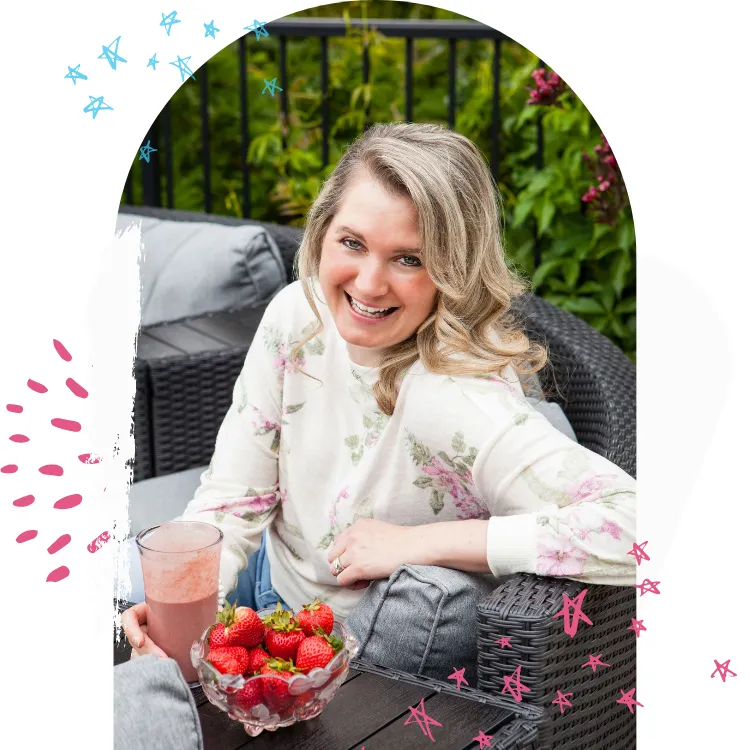Is Perimenopause Running the Show (and Not Letting You Read the Script)?
Let’s change that—starting today.
Perimenopause can feel like a full-time job no one trained you for. The mood swings. The fatigue. The 3AM anxiety spirals. Sound familiar?
You don’t have to do this alone—and you shouldn’t
have to piece it together from late-night Google searches. That’s why I created these free guides to help you cut through the chaos and start feeling like you again.
Grab one now and get real-life tools to support your hormones, energy, mood, and more.

What Even is Perimenopause?
Think of it like the winding (and sometimes bumpy) road leading up to menopause. It usually kicks off in your 40s—but for some women, it can start even earlier.
Hormone shifts during this time can cause symptoms like:
✅Hot flashes that hit out of nowhere
✅Mood swings that rival your teen years
✅Night sweats, brain fog, and libido plot twists
✅Irregular periods that love to keep you guessing
Sound familiar?
It can feel like your body’s rewriting the script without telling you—but here’s the thing:
You’re not broken. You’re transitioning. And it’s completely normal.
The key is having the right tools, support, and knowledge to navigate it with more clarity (and a lot less confusion).
Hi, I'm Kim
Holistic Nutritionist. Certified Menopause Coaching Specialist. Midlife truth-teller.
I’ve been where you are—confused, exhausted, and wondering if I was the only one Googling “why do I feel like a hormonal alien?” at 3AM.
Now, I help women in midlife ditch the guesswork and get real support for their hormones, health, and emotional well-being. My approach blends science-backed tools, mindset shifts, and plenty of permission to not have it all together!
This isn’t just about surviving perimenopause.
It’s about reclaiming your energy, your mood, your body—and your joy.

My Approach: Real Support, Real Women, Real Results
Let’s be real—midlife health advice often feels like it was written for 25-year-olds with zero hormone chaos and unlimited time. That’s not you. And it’s definitely not me.
Here’s what I believe:
✅You don’t need to “push through” or “just deal with it.”
✅Your symptoms aren’t in your head—they’re in your hormones.
✅Real change happens when we stop judging ourselves and start supporting ourselves (with food, movement, rest, and compassion).
As a Holistic Nutritionist and Menopause Coaching Specialist, I focus on science-backed strategies
blended with grace, humor, and zero shame. Whether you’re dealing with mood swings, fatigue, or a libido that ghosted you—there’s a way forward.
My work isn’t about perfection—it’s about giving your body what it needs and your mind the space to catch up.
From the Blog: Real Talk for Real Hormones
No fluff. No fear-mongering. Just science-backed advice, cheeky encouragement, and the kind of midlife support you actually want to read. Whether you're riding the emotional rollercoaster or wondering if brain fog is your new personality—I've got you.

Hot Flashes, Weight Fluctuations & WTF Moments: Welcome to Perimenopause
✨ Perimenopause Power Moves: 5 Simple Nutrition Shifts to Help You Feel Like Yourself Again! ✨
Grab your free guide today!
👉 Download Now!
Hot Flashes, Weight Fluctuations & WTF Moments: Welcome to Perimenopause
"So many women I've talked to see menopause as an ending. But I've discovered this is your moment to reinvent yourself after years of focusing on the needs of everyone else. It's your opportunity to get clear about what matters to you and then to pursue that with all of your energy, time and talent." — Oprah Winfrey
Understanding Perimenopause: What’s Happening to Your Body?
Perimenopause. Just the word can stir up a mix of curiosity, dread, and maybe even wonder. If you've been staring in the mirror asking, “What is happening to me?”—you’re not alone.
This phase of life is like your body's own personal metamorphosis. But instead of sprouting wings, you might notice hot flashes, stubborn weight gain, or skin that feels... different.
Let’s dive into the fascinating (and sometimes maddening) physical changes of perimenopause—what’s behind them, and how to navigate them with empowerment, compassion, and maybe even a little humor.
The Hormonal Symphony (and Its Chaotic Remix)
At the heart of perimenopause is a hormonal remix that your body is DJing. Estrogen and progesterone, once reliable, begin fluctuating wildly, setting off a cascade of changes. Here’s what’s happening:
Hot Flashes & Night Sweats
That sudden, fiery wave that has you peeling off layers in the middle of winter? That’s your brain’s thermostat (the hypothalamus) misfiring due to hormonal shifts, triggering blood vessel dilation and sweat—a biological sprinkler system.
Weight Gain & Body Shape Shifts
Noticing a shift in how your body stores fat? Declining estrogen slows down lipid metabolism, while reduced testosterone and growth hormone sap muscle mass. The result? A slower metabolism and a stronger gravitational pull toward your waistline.
👉 Let’s be real: it’s not just about eating more kale. If you’re wondering why your jeans suddenly have an attitude problem, I go deep into the science and strategies in this blog on perimenopausal weight gain. Spoiler: it’s not your fault—and there’s a better way forward.
"I see menopause as the start of the next fabulous phase of life as a woman. Now is a time to ‘tune in’ to our bodies and embrace this new chapter. If anything, I feel more myself and love my body more now, at 58 years old, than ever before." — Kim Cattrall
Skin Changes
Collagen production takes a hit as estrogen declines, leading to thinner, drier skin and more wrinkles. In fact, up to 30% of collagen is lost in the first five years of menopause. Time to double down on hydration, healthy fats, and skincare!
Vaginal Dryness & Urinary Changes
Estrogen keeps vaginal tissues supple and the urinary tract in balance. As levels drop, dryness, irritation, and increased UTIs can follow. The good news? Bioidentical vaginal estrogen can be a game-changer for comfort and intimacy.
Breast Changes
Hormonal fluctuations can make breasts feel tender, lumpy, or even denser. Regular self-exams and medical checkups are key for monitoring changes.
Navigating Perimenopause Like a Pro
1. Fuel Your Body with Purpose
Your diet can be your best ally during perimenopause. Focus on nutrient-dense foods to support your body’s transition:
Protein Power: Maintain muscle mass, strong bones and stabilize blood sugar with lean meats, fish, eggs, Greek yogurt, and plant-based options like lentils, quinoa, and tofu. Aim for 0.8-1 gram of protein per pound of ideal body weight.
Phytoestrogens: Found in flaxseeds, soy, and chickpeas, these plant compounds mimic estrogen and can ease symptoms like hot flashes.
Omega-3s: Fatty acids from fish, walnuts, and chia seeds support brain, heart, and joint health.
Bone Strengtheners: Calcium and vitamin D help counteract estrogen-related bone loss. Get them from leafy greens, sardines, and fortified plant milks.
⭐Eating balanced meals with protein, healthy fats, and fiber can help you feel full longer, maintain muscle, and regulate mood.
2. Embrace Strength & Movement
Movement isn’t just about staying active—it’s about building resilience.
Strength training helps prevent muscle loss, boosts metabolism, and supports bone health.
Yoga and restorative movement calm the mind, improve flexibility, and lower cortisol (hello, stress belly).
Daily walks support heart and bone health while easing mood swings and boosting energy..
3. Stay Hydrated
Hydration is crucial for your skin, energy levels, and vaginal tissues. Water is great, but also load up on high-water-content fruits and veggies like cucumbers, berries, and oranges.
4. Explore Natural Remedies
Black cohosh has been studied for reducing hot flashes.
Sea buckthorn oil is known for vaginal dryness relief.
Magnesium supports sleep and muscle relaxation.
⭐Always consult your healthcare provider before diving into supplements.
5. Reframe the Mirror Talk
Instead of criticizing your reflection, start appreciating your body's resilience.
“The very best way that you can help yourself is to develop and sustain a positive attitude. The way you think and feel about everything will make all the difference to your experience.” — Caroline Carr, author of Menopause: The Guide for Real Women
When to Check in with Your Doctor
Most perimenopausal changes are normal, but some symptoms warrant medical attention:
Persistent, heavy, or irregular bleeding
Painful intercourse despite lubrication
Persistent bloating, pelvic pain, or skin changes that don’t heal
⭐Your doctor should be a partner in this journey—if they aren’t, don’t hesitate to seek a second opinion.
The Art of Resilience
Perimenopause isn’t just about physical changes—it’s a transformation on every level.
Yes, it’s messy and uncomfortable at times, but it’s also an invitation to understand your body more deeply. Lean on your friends, swap remedies, share book recommendations, and most importantly—give yourself grace.
Every challenge is an opportunity to build strength and self-compassion.
So let’s honor the chaos, celebrate resilience, and embrace this next chapter—one hot flash at a time.
You’re not just surviving perimenopause—you’re thriving through it.
Hormonally Yours,
Kimberlee Erin
Just a heads-up: I’m a Certified Menopause Coaching Specialist and Holistic Nutritionist, and while I love sharing what’s worked for me and my clients, this blog is for informational purposes only. It’s not a substitute for medical advice. Always check in with your healthcare provider before starting new supplements, hormones, or treatments—especially since every woman’s perimenopause journey is different. You deserve personalized care that truly fits you.
Meeting Kim was a turning point in my perimenopause journey. I was overwhelmed by the constant fatigue and emotional ups and downs. Kim’s holistic approach helped me understand what my body was going through. Her personalized nutrition plans and stress management techniques have been a lifesaver. I now feel more balanced and in control of my health. Kim's support has been nothing short of amazing.
- LIZ
FREE DOWNLOAD
